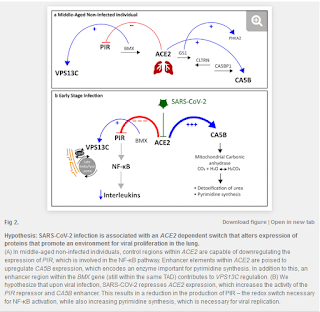Metformin use associated with 70% mortality reduction in covid-19 patients with diabetes
Since March, I have been hoping someone would study whether covid-19 patients with type 2 diabetes (T2D) on metformin fare better than those on other types of anti-diabetes medications. Many of the risk factors associated with severe covid-19 (e.g., obesity, diabetes, hypertension, older age) relate to AMPK signalling and metformin, a drug that improves AMPK signalling, has been found to benefit these conditions. My question has finally been answered - T2D patients on metformin have a 70% reduced risk of death as compared with those on other anti-diabetic medications [1,2]. Unfortunately the study did not control for other important factors such as age, degree of blood sugar control, BMI, and time since diagnosis; a future study designed specifically to examine metformin in covid-19 should be conducted that controls for these factors. The study authors discuss the potential role of AMPK signalling in covid-19, delineating a number of possible mechanisms by which it cou...
